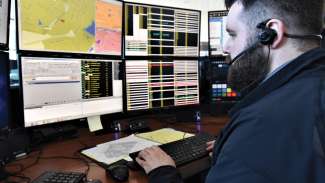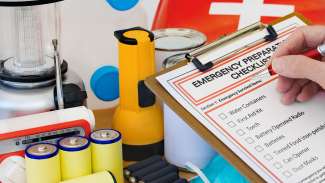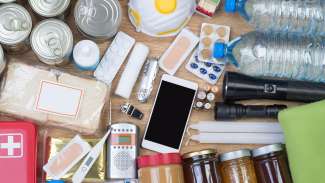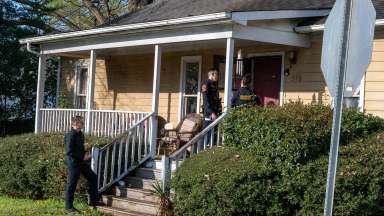Jump To:
About this guide: The City of Raleigh has compiled the information on this webpage to help you prepare yourself, your family, your home and your community for emergency situations. This guide contains information about how to contact government agencies for specific information before or after an emergency, how to compile an emergency kit for your household, and what to do during specific natural and man-made hazards. This webpage is not meant to be a comprehensive source and additional resources are provided in each section.
All of the resources listed on this page are also available as a booklet.
Digital Booklet
- Booklet for download and/or print: Ready Raleigh Emergency Guide
- Spanish Version: Una guía de preparación para desastres
Utility Companies
Visit our Ready Raleigh Guide Workbook page. The workbook has several charts like the one below, you can complete. It also has an emergency supplies checklist you can check off.
| Name | Phone Number | Service |
|---|---|---|
| example: Duke Energy Progress |
800-228-8485 Report online |
example: report fallen power lines |
| your electric company | ||
| your cable company | ||
| your phone company | ||
| your gas company | ||
| others? |
Emergency information and alerts
Make sure WEA alerts are activated on your smart phone.
Local news and radio stations:
- The News & Observer - daily newspaper covering North Carolina’s Triangle Region
- WRAL - NBC-affiliated television station (Digital channel 17)
- WTVD - ABC-affiliated television station (Digital channel 11)
- WNCN - CBS-affiliated television station (Digital channel 8)
- WUNC - National Public Radio station (91.5 MHz FM)
- NOAA Weather Radio Stations (Triangle Area) - Chapel Hill 162.550 Garner 162.450
Websites:
- City of Raleigh - information about city services
- Wake County - information about county services
- ReadyWake.com - Wake County - county-level emergency preparedness information and weather alerts
- National Weather Service - Weather forecasts, watches, warnings, weather safety information
- Ready.gov - U.S. Department of Homeland Security - national-level emergency preparedness information
- ReadyNC.org - North Carolina Department of Public Safety - state-level emergency preparedness information
- www.usgs.gov/centers/sawsc - United States Geological Survey South Atlantic Water Science Center Flood Gauge Monitoring
Twitter:
- @RaleighGov - the City of Raleigh communications team posts up-to-date information on our Twitter feed
- @ReadyWake - sign up for emergency alerts through ReadyWake
- @NWSRaleigh - National Weather Service Raleigh
- #ncwx - hashtag used during weather events by the agencies listed above and others
Facebook:
- @CityOfRaleigh - the City of Raleigh communications team posts up-to-date information on our Facebook feed
Section Two: Be Prepared
Make a Plan
Planning for emergencies will help ensure everyone in your household will know what to expect and what to do in case a disaster strikes.
Visit our Ready Raleigh Guide Workbook page. The workbook has several charts you can complete and an emergency supplies checklist you can check off.
Plan an Evacuation Route
Contact Wake County Emergency Management at 919-856-6480 for questions on the safest evacuation routes and possible shelters in the event of an emergency.
- Be ready to drive 20 to 50 miles inland to locate a safe place.
- Have disaster supplies on hand.
- Remember to bring essential medicines, cash and credit cards.
- Wear sturdy shoes and/or waterproof boots.
Make Arrangements for Pets
Pets may not be allowed into emergency shelters for health and space reasons. Pets depend on us for their safety and well-being, so be sure to include them in your family emergency plan. If you must evacuate, the most important thing you can do to protect your pets is to evacuate them with you.
In an emergency, remember that pets can react differently under stress, so be sure to have your dogs securely leashed and transport your cats in pet carriers.
Do not leave your animals unattended where they can run off, and don't turn them loose during an emergency. The most trustworthy pets may panic, hide, try to escape, or even bite and scratch.
Be sure that your dogs and cats are wearing collars with up-to-date rabies and identification tags that are securely fastened. Consider having your pet microchipped in case your pet become loose and loses his or her collar or tags.
For information on local animal shelters, contact the City of Raleigh Animal Control at 919-831-6311 or Wake County Animal Control919-212-7387.
- Make sure that all family members know how to respond after a hurricane.
- Teach family members how and when to turn off gas, electricity, and water.
- Teach children how and when to call 9-1-1, police, or fire department and which radio station to tune to for emergency information.
- In case family members are separated from one another during a disaster (a real possibility during the day when adults are at work and children are at school), have a plan for getting back together.
- Ask an out-of-state relative or friend to serve as the "family contact." After a disaster, it's often easier to call long distance. Make sure everyone in the family knows the name, address, and phone number of the contact person.
Protect Your Windows
- Permanent shutters are the best protection. A lower-cost approach is to put up plywood panels. Use 1/2 inch plywood - marine plywood is best - cut to fit each window. Remember to mark which board fits which window.
- Pre-drill holes every 18 inches for screws. Do this long before the storm.
- Trim back dead or weak branches from trees.
Check Into Flood Insurance
Homeowners are advised to review their current insurance policy and become familiar with what is and is not covered, as damage due to flooding is typically not covered. Call your insurance agent to purchase flood insurance through the National Flood Insurance Program for your home and/or business and its contents. Talking to an agent also will provide answers as to what flood insurance does and does not cover. There is a usually a 30-day waiting period before coverage begins and coverage is relatively inexpensive. Renters can buy flood insurance and/or contents coverage for personal belongings or business inventory. Landlords are only responsible for insurance on buildings. To learn more about your flooding risk and how to protect yourself and your business, visit the Federal Insurance and Mitigation Administration (NFIP) website, www.floodsmart.gov or call 1-800-427-2419.
Build a Kit
Keeping an emergency preparedness kit in your home can help your household be ready for a variety of emergencies. An emergency kit should provide supplies for your household for up to three days without power. The kit should be kept in a sturdy bag. Rethink your needs every year and update your kit as your family’s needs change.
Visit our Ready Raleigh Guide Workbook page. The workbook has several charts you can complete and an emergency supplies checklist you can check off.
The following items should be included in your home emergency kit:
- Three-day supply of food, including pet food, that does not need to be refrigerated;
- Three-day supply of water --- one gallon of water per person, per day;
- Battery-powered radio or TV and extra batteries;
- Flashlight(s) and extra batteries;
- First aid kit and manual;
- Hand sanitizer or wipes and other hygiene items;
- Matches and waterproof container;
- Whistle. This will be needed to get someone’s attention if you are trapped, have fallen or in some other kind of trouble;
- Extra clothing;
- Kitchen items and cooking utensils, including a non-electric can opener and trash bags;
- Copies of credit and identification cards, and medical and veterinary records;
- Cash;
- Special needs items for family members and pets, such as prescription medications, eye glasses, contact lens solutions, hearing aid batteries and means to transport pets;
- Items for infants, such as formula, diapers and bottles;
- Maps and emergency contact numbers, including doctors and veterinarians; and,
- Other special items that your family or pets might need.
Emergency Supplies
Stock a three-to-five-day emergency supply of food and water prior to the onset of a storm. Include food that requires no cooking such as canned meats, peanut butter and other non perishables. Be sure to have a manual can opener on hand.
Medicines - Make sure you have three to five days supply of any necessary medicines.
Heating Fuel - Keep an adequate supply of heating fuel (firewood, kerosene, etc) at home. Use your fuel sparingly as supplies may be short or unattainable due to hazardous conditions.
Essential Supplies - Keep a flashlight, battery-powered radio, extra batteries and a first aid kit on hand.
Water Pipes - Protect water pipes from freezing by wrapping them with insulation or newspaper covered with plastic. In severely cold weather, leave faucets dripping slightly to avoid freezing. If your pipes do freeze, remove the insulation and wrap the pipes in rags. Open every faucet in the house and pour hot water over the rage-wrapped pipes. Also, be sure you know how to shut-off the water supply from your home should water lines break.
Family - Make sure that every family member knows how to evacuate the house in the event of a fire. Make sure you and your family members designate an outdoor meeting place.
DO NOT
- Heat your home using a charcoal grill, gas grill or camp stove. Grills and camp stoves create deadly carbon monoxide fumes that will build up and create a lethal environment in your home. Always use grills out of doors; and,
- Colder temperatures mean a spike in the number of house fires. Someone in the United States dies in a house fire every 2 ½ hours.
- Chimney fires are the leading cause of home-heating fires. Typically they are caused by poorly maintained chimneys where creosote has accumulated.
- Space heaters are involved in 25 percent of home-heating fires but account for 74 percent of the deaths. These involve every type of space-heating equipment – electric heaters, kerosene heaters, wood stoves, fireplaces and gas heaters. Common causes of space-heating home fires include placing space heaters too close to combustibles and fueling errors involving liquid or gas fueled heating equipment.
Lend a hand
Friends and neighbors can be our first line of defense in an emergency. They can help watch out for your family and your home. Building connections and relationships with your neighbors can strengthen your community’s overall level of responsiveness to a disaster or emergency. This is especially true for people who do not have the physical strength to adequately prepare their home for a disaster. Community groups, neighborhood associations, school groups, teams and clubs can be sources of support during times of disaster.
As you plan and prepare your family for emergency situations, reach out to your neighbors and share contact information and other important data with them. In the event you or members of your household are injured, your neighbors may need to share vital information with first responders.
Get to know your neighbors and check on them regularly before, during and after an emergency.
Identify in-area contact people and make sure they know:
- Your household evacuation plan
- Emergency contacts
- Any special healthcare needs in your household
- Mobility needs
- Communication needs
- Languages spoken
- Cultural and religious considerations
Collect the same information from your neighbors. This will help you and them prepare and respond to emergency situations.
Before an emergency: Check in!
As you prepare your kit, check with friends and neighbors that they have all the supplies they will need for the emergency. Offer to drive them to the grocery store or help bring in outdoor furniture.
During an emergency: Stay in touch!
If possible, keep in contact. Do not put yourself or your neighbors in danger by going outside if it is not safe to do so. If power and communications go out, make sure you have a plan for when you will be in touch after the emergency passes.
After an emergency: Follow up!
Check to see if your neighbors’ homes have been damaged, if power has been restored, etc. Ensure that their healthcare needs are met. If necessary, reach out to their emergency contacts.
Keep track of important household emergency contacts.
Visit our Ready Raleigh Guide Workbook page. The workbook has several charts you can complete and an emergency supplies checklist you can check off.
Section Three: Be Informed
This section contains information on specific hazards that may affect the Raleigh, N.C., area. Each section will give information on what to do before, during and after the hazard and other resources and information.











